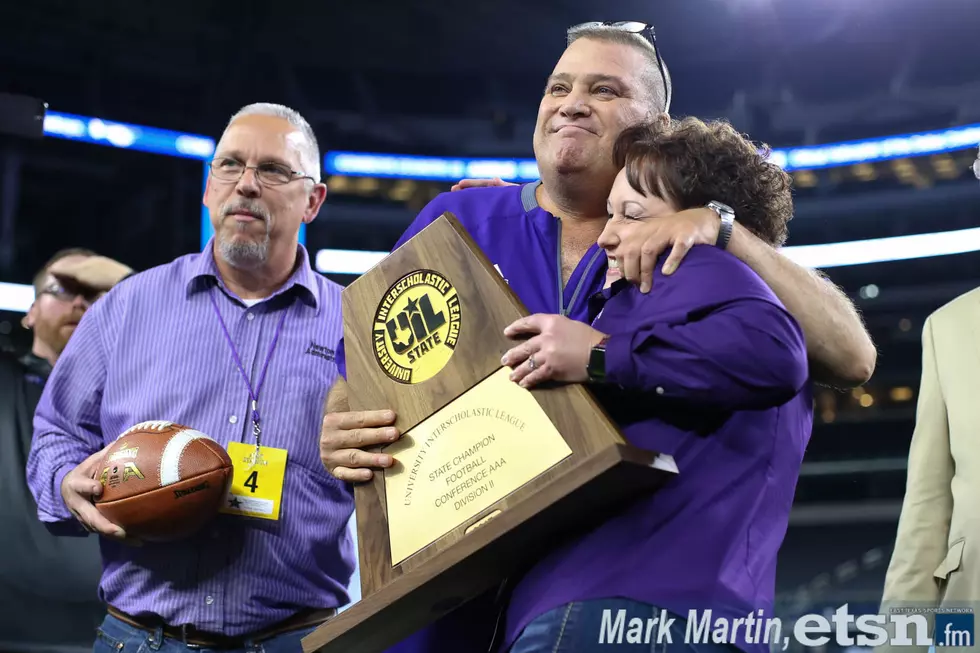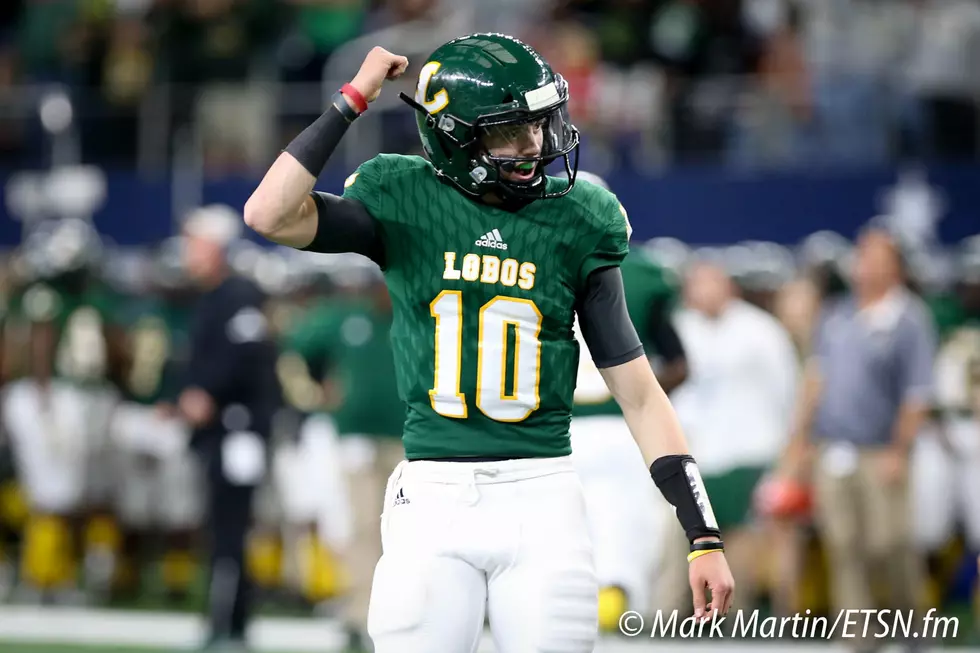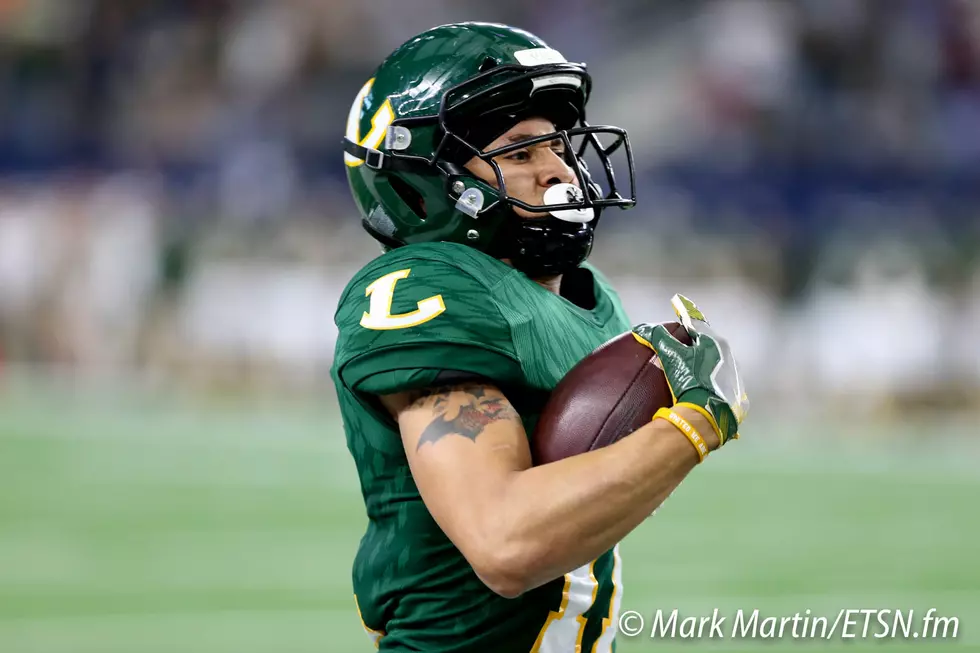
Purple Pride Never Dies: The Winning Tradition of Newton Football
NEWTON — It’s the first day of practice for Newton coming off a 3A Division II state championship. Dragonflies buzz around in the muggy August heat.
Even those not running, hitting or catching footballs are sweating. That includes W.T. Johnston.
As the Eagles’ coach, Johnston has to take surveillance of each group, which involves a lot of running around. But in recent years, standing for more than a few minutes has become a chore.
He developed chronic graft-versus-host disease of the lungs, an extremely rare condition of which there are only four other U.S. cases, in 2015. Clear tubing connected to an oxygen tank runs up his nostrils. He is in constant pain, so much so that he sometimes gets only one or two hours of sleep in a night.
None of this keeps him away from football.
Although he can’t be on his feet for long, he can drive a golf cart. So he zips from position group to position group, barking orders until his lungs can’t take it. He pauses to cough before zooming off again unexpectedly.
Working as an assistant under Curtis Barbay for several years in the 1990s and 2000s, Johnston developed a reputation as a gruff and fiery coach. Not much has changed in that regard.
The players line up to do sprints as coaches set up cones to mark the boundaries. Johnston stops, puzzled.
“How far are they going?” he asks.
“Thirty yards,” an assistant replies. “Want me to go 40?”
“Hell yeah, quit babyin’ ‘em.”
Johnston has spent all but two seasons since 1991 with the Eagles. He left in 2009 for Kirbyville, but returned to take the head job after Barbay’s death in 2010. He also took a brief detour to Little Cypress as an offensive coordinator in 1993, but quickly realized his error.
“We were 6-4 and everybody thought we did good and I said, ‘That ain’t good,’” he said. “‘I gotta get out of there and go where 6-4 ain’t good.’”
Newton has not had a season in which it won fewer than eight games since 1993.
Johnston’s loyalty to the Eagles has been unwavering following his return. Even when he coached at Kirbyville, he lived in Newton.
Something about the city pulled him back each time he tried to leave, whether it was the way they’ve raised money for his medical expenses or how the football field looks like a “reunion party” after every graduation with people talking and laughing under the lights. Years of memories and experiences in Newton have shaped Johnston into who he is. Now, reclining in a chair inside his small office, he acknowledges he wouldn’t spend his last days anywhere else.
“I’ve always told my coaches, you’ve got to go somewhere you fit,” he said. "You can be a great coach, but if you go somewhere you don’t fit in, you’re not going to be able to coach.
“I fit here.”
***
Empty buildings aren’t difficult to spot in Newton.
The steady decline in population in recent years has forced many businesses to close. Cajun Joe’s Cafe, nestled in the center of downtown, is the lone local dining option. Lack of jobs and economic repression was a common lament among the residents.
One business, however, has found a formula that works in Newton.
On Rusk Street next to the post office sits a purple building. Paintings decorate its sides: an Eagle flying with a diploma secured in its talons, a football player attempting to make a catch, a smiling baseball, a soaring golf ball and more.
Inside sits Kay Jones, owner of Purple Zone Kreations and a cheerleader for the 1974 state championship team, the first to win a title in Newton. Behind her are boxes filled with T-shirts that will soon have the Newton logo printed across the front. The shop’s signature shirt, dark purple with a menacing eagle on top of a large ‘N’ and the slogan “We Are Newton,” hangs from the ceiling.
She opened the store in 2011 along with her daughter-in-law, LaDonna Jones. They design all T-shirts in house with screen printing equipment and also do trophies and hats.
Today, they are the only ones in the store. During football season, Jones will need more employees to keep up with the orders, especially on Thursday and Friday afternoons.
“In a small town, football is our main money,” Jones said. “It’s hard for a business in a small, rural town. But (we can be profitable) because of the way people are here about football.”
Jones left Newton for six years after graduating high school. But like Johnston, she felt the need to return. In addition to owning the store, she is the cheer sponsor and teaches home economics at the high school. She manages a student-run restaurant that opens twice a week and this past school year included football players Seth Craft, Darwin Barlow, James Sylvester and Ty Seastrunk as cooks.
“(Newton is) a good place to raise your children,” Jones said. “It’s somewhat safe. Everybody knows everybody. It takes a village to raise your children. That’s the way it is here. If I see somebody’s kid and they’re not doing what they’re supposed to do, I’ll tell ’em. I treat all the kids like my own.”
Although Jones has found success with her store, that is atypical for a business in Newton. Many graduates begin looking elsewhere long before they walk across the stage.
Craft, a senior defensive end, already has plans to leave once he graduates. He secured a job at a Toyota plant in San Antonio.
“The opportunities are away,” Craft said. “If you want a job, you’re not going to get something that’s going to pay a lot. It’s just not that big enough of a town. One of the only ways to get out of here is to play sports. That’s probably the biggest reason that people in Newton are so good.”
Craft offers a unique perspective on Newton football. Unlike most of the players, he was not born here. He moved from Baytown, a town of nearly 80,000 near the Gulf Coast, before his sophomore year. Craft noticed the subtle differences that, he believes, Newton’s success is built upon.
“Discipline (is the biggest difference),” he said. “Small things like making sure the floor is clean. Houston, they don’t do that. The coaches and the athletes get closer. They respect them sort of like a parent. That’s what the coaches are to the athletes here.”
While Craft pursues a professional life away from Newton, Purple Zone Kreations should continue to thrive. It has come to be an outlet for people to express pride for the only thing that seems worth being proud of.
“We’re stuck out in the woods and not too many people know of Newton,” Jones said. “But when you say football, they recognize Newton for that.”
***
Johnston got the call on a Thursday.
“You need to go talk to coach Barbay,” his wife said. “He said he wasn’t feeling well.”
Johnston knew it had to be serious. It wasn’t like Barbay to complain. He went to visit Barbay at his house after a junior varsity game in Kirbyville that evening. Barbay said he was worried about the game.
“You’re worried about Buna?” Johnston asked.
“No, I’m worried about making it through the game,” Barbay said.
He planned to go to the doctor Monday. Johnston urged him to sit in the press box, but Barbay didn’t listen. He collapsed at halftime after suffering a heart attack.
Barbay was taken to Christus St. Elizabeth Hospital in Beaumont. He died Saturday morning.
Johnston was heartbroken. Barbay is, to this day, his greatest mentor and friend. When Johnston took the job early in 1991, he didn’t receive paychecks until football season. Barbay got him a summer job, and Johnston would rush home at 5 p.m. to go fishing with him every day.
“He was always somebody you could go to,” Johnston said. “He was a father figure to the kids and to the coaches. He was a different cat. He was rough around the edges, but he was a good guy. There probably won’t ever be coaches like that. I’ve been trying to get him in the high school coaches hall of fame. How he’s not in it is unbelievable to me. There’s not many people that have won 300 games.”
There have been three coaches at Newton since 1968. Barbay accounts for 37 of those 50 years. Johnston still runs the same offensive and defensive schemes that Barbay learned from Lidney Thompson.
That, in Johnston’s opinion, is the secret behind the Eagles’ success. Each coach has been a protege of his predecessor. He hopes that trend will continue with one of his assistants being promoted when he inevitably passes.
“I think it’d be a mistake if somebody came in and tried to change things,” he said. “Newton’s won a lot of games. I don’t see why you would change something that has been working.”
Drew Johnston is one of those candidates.
The defensive coordinator and son of Johnston, Drew has dreamed of becoming the head coach since he was a boy. Despite receiving several calls from coaches looking to hire him in the past few years, he has made a promise to himself to stay put, content to enjoy the time left with his dad.
The past 15 seasons have brought many memories for the pair, including a state championship in 2005 when Drew was a player. But none compare to the sheer emotion of Newton’s 2017 championship.
Drew had been uptight in his preparation leading up to the game. He wanted everything to be perfect. If the Eagles fell out of the playoffs, it surely wouldn’t be because of him. He lost his temper a couple of times.
In the moments following the Eagles victory, as medals were presented and people flooded the field, he hugged his dad tight.
“I’m sorry,” he said. “I just wanted you to get this one.”
“I know,” Johnston replied.
***
Bobby Bean’s eyes well up with tears of pride behind his glasses as he talks about Newton football.
He forces a smile and laughs.
“Any questions?” he asks.
He sits in a cafe in Bon Wier on the state line of Louisiana and Texas, aptly named Stateline Cafe. He is wearing a purple shirt underneath blue overalls and has long gray hair neatly tied into a ponytail that sticks out the back of his Texas Longhorns hat.
Bean makes most people in Newton look like casual fans. A player under Thompson in the late 1960s, Bean is the president of the booster club. He published a book this summer, “Once an Eagle,” detailing the history of Newton football.
Bean was reluctant to write the book at first. It wasn’t his idea. He received a call from Sam Collins, who served as the public address announcer at Newton football games for 56 years until 2010. When he started in the 1950s, he carried a PA system in the trunk of his car, unloading and loading it before and after each game.
Collins, now 90, implored Bean.
“Bobby, we’re losing our history every day,” he said.
That was enough for Bean.
“I had never thought about it like that,” Bean said. “Our older generations are dying. Being a small community, there’s not a lot of documentation. We barely had a paper. We’re losing this history. The oldest living player played in 1940 and he’s dying for this book to come out. He goes to some of the games. He’s purple and white all the way. How can you say no to something like that?”
The book begins in 1915 and ends with a detailed recap of the Eagles’ state championship victory against Gunter this past season. It is filled with interviews from current and former players and coaches. Bean’s pride for not only his football team, but also his city is evident within its pages.
But as proud as he is, Bean can’t deny the current state of Newton. When he was in high school, there were more than 500 students. That number has been nearly cut in half since.
“What pride is there in a bunch of closed and shuttered up windows?” he asks. “Ain’t no pride there. The pride is line up on the football field and we’ll butt heads.”
In the final pages of the book, Bean does his best to articulate why football means so much to the tiny town of a little more than 2,000. Among the several paragraphs, one sticks out.
In the heat of muggy Augusts past, football begins as it has for 103 years, only occasionally broken by world events and growing pains. Now, Eagle football is part of the fabric of Newton, Texas, inseparable from the town, carved in the hearts and imaginations of the people. Life here cannot be imagined without it.
***
Darwin Barlow excitedly pulls up a picture on his phone.
The photo shows Barlow standing with a boy about 10. The boy is beaming.
“This is Hunter,” Barlow says.
Barlow, Newton’s star running back and a TCU commit, has known Hunter for a while. He sees him at every pep rally. They have developed a friendship over the years. Barlow sees himself in Hunter, who hopes to one day play for the Eagles.
“Every time he sees me, he runs up and gives me a big hug and about tackles me to the ground,” Barlow said. “It makes me feel happy every time. He says I’m his favorite football player. You feel the excitement and the joy that you bring to a kid. He thinks the world of you.”
It’s common in Newton to see kids running around football practice, watching the team and dreaming of one day being in their shoes. Barlow was once one of those kids. So was Drew.
“You knew who everybody was,” Drew said. “Knew everybody’s number. Normally, we’ll go run the practice bus and there might be 10 little elementary kids get on the bus because it’s their cousins and brothers and they come with them. They think they’re supposed to be up here. It’s always kind of been like that.”
Hunter could be the next great Newton football player. He could come back as a coach. He could simply be a bench player. But his association with the football team, like everyone in Newton, seems predestined.
Johnston begins this season not knowing whether he will see the end. He plans to coach from the sidelines with the help of a wheelchair. Like Barbay, it might take death to remove him from the team completely. Unlike his mentor, Johnston has been gifted with time to consider his situation. It has allowed him to view things from a new perspective.
Although the Eagles are predicted by nearly every pundit in the state to repeat as champions, Johnston doesn’t have the itch to win that he did in 2017. His name already has a place in Eagle lore. He is more concerned with what will happen after he dies. The players and coaches he has instructed in the past 27 years will carry a new generation of Newton football. He can only hope he did enough to keep the tradition alive.
“Hopefully I’ve instilled something in them and that means you won’t ever die,” he said. "Part of you will go on. How they are five and six years from now is what’s going to define me. What kind of young men they’ve become and what kind of families they have is what I’d talk to them about. How responsible they are. That’s the most important thing. The X's and O's is the easy part. It’s the other part you’ve got to spend time on.”
More From East Texas Sports Network









